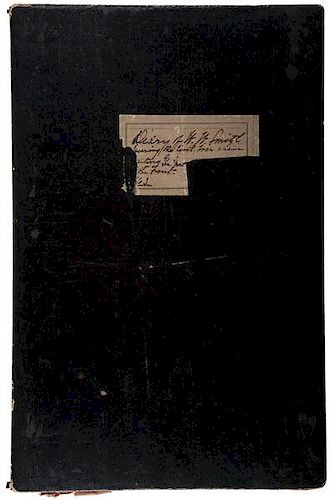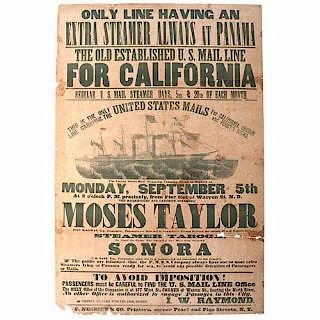William Wrenshall Smith, Civil War Diary Pertaining to his Service with U.S. Grant as Aide-de-Camp at Chattanooga
About Seller
6270 Este Ave.
Cincinnati , OH 45232
United States
With offices in Cincinnati, Cleveland and Denver, Cowan’s holds over 40 auctions each year, with annual sales exceeding $16M. We reach buyers around the globe, and take pride in our reputation for integrity, customer service and great results. A full-service house, Cowan’s Auctions specializes in Am...Read more
Two ways to bid:
- Leave a max absentee bid and the platform will bid on your behalf up to your maximum bid during the live auction.
- Bid live during the auction and your bids will be submitted real-time to the auctioneer.
Bid Increments
| Price | Bid Increment |
|---|---|
| $0 | $25 |
| $500 | $50 |
| $1,000 | $100 |
| $2,000 | $250 |
| $5,000 | $500 |
| $10,000 | $1,000 |
| $20,000 | $2,500 |
| $50,000 | $5,000 |
| $100,000 | $10,000 |
About Auction
Jun 10, 2016 - Jun 11, 2016
Cowan's Auctions dawnie@cowans.com
- Lot Description
William Wrenshall Smith, Civil War Diary Pertaining to his Service with U.S. Grant as Aide-de-Camp at Chattanooga
Lot featuring 43pp handwritten report of W. W. Smith’s journey to the Chattanooga battle, plus what appears to be a later rewrite of the first 8pp of the handwritten report; 11 x 17 in. black traveling secretary used by W. W. Smith as he visited Grant in 1863; two 8.5 x 14 in. printed letters from Union veteran Alfred King promoting the naming of one public school building in each town for Abraham Lincoln, Feb. 12, 1926; two 8.5 x 14 in. sheets entitled “ The Secret Of Lincoln’s Greatness,” Feb. 12, 1926; 8.5 x 11 in. print of Smith.
The highlight of the lot is the manuscript, first-hand account of the Battle Of Chattanooga as W. W. Smith accompanied Ulysses S. Grant, his good friend and cousin by marriage, before, during, and after this crucial Union victory. The report covers November 3, 1863 through December 2, 1863, and includes Smith’s interaction with Generals Grant, Sherman, Thomas, Hunter, Baird, Hooker, Stanley, and six other generals. He also met the prisoner son of John C. Breckenridge, Confederate General and former Vice President of the United States as well as correspondents Sylvanus Cadwallader of the Chicago Times and Charles Dana of the New York Tribune.
Baggage packed and General Grant’s pass in my pocket, I start on Tuesday morning November 3 for Chattanooga to see a battle, writes an excited William Wrenshall Smith on November 3, 1863. I ship by express quite a large box containing 10 gal. of fine whiskey, catsup, pickles and segars . . . supposing it will not go through safely if directed to myself - I directed it to General Grant.
Smith’s anticipation of significant combat was visionary as he not only watched one of the great military deceptions in the Civil War but also viewed at close quarters the brutally historic conflicts on Missionary Ridge and Lookout Mountain.
After a long train ride, Smith arrived in Cincinnati. He visited Covington, KY in hopes of seeing his cousin, Mrs. Julia Grant, but the General’s mother told him she had gone to Louisville and gave him a bottle of wine for General Grant. At Louisville Smith found that Mrs. Grant had already returned to Ohio. On November 9 he left Louisville for Nashville, TN. On approach to Nashville he noticed elegant mansions were more numerous and opulent. We occasionally see the sad havoc of war in the ruins of factories and bridges. Smith’s attempt to travel south was at first rejected but when Major Rawlins saw the pass from General Grant he said, Oh this is good. He immediately ordered a transportation force to Chattanooga. Smith writes, There is nothing like having the right kind of documents.
A tour of Nashville and the Capitol Building greatly impressed Smith. He states, It is decidedly after the Capitol at Washington – the finest building on the continent.
On November 11, 1863, Smith noted that only officers are permitted to go to the “front”. An inspector requested that he open his baggage but when shown Grant’s pass the inspector bowed and walked on. As the train went farther south all railroad bridges were guarded. A captain on General Starkweather’s staff was a pleasant companion on the train. The train stopped at Stevenson, AL. The train to Bridgeport never arrived and along with his officer friends, Smith stayed that night at the Alabama House . . . the most miserable tavern I ever saw. All got into one room – some in the beds and the balance on the floor.
A rickety ship was loaded and it carried Smith to Kelley’s Ferry as the enemy had possession of the river above. The planned on horses did not arrive and all started on foot for Chattanooga. Camps became plentiful. Most were General Hooker’s troops. Now under the famous Lookout Mountain and within range of the cannon and every moment expected a shot from the enemy but passed clear to Chattanooga and over two pontoon bridges without any interruption. Received directions which led to General Grant’s headquarters…a neat little white frame house overlooking the river. After a hearty greeting by General Rawlins, Colonel Lagow dismounted and insisted on Smith taking quarter in his room which was opposite to General Grant’s. In a short time the General arrived, greeted Smith cordially, and took him into his room. He put his quarters and his horses at his disposal.
On Nov. 16, 1863, many general officers met at headquarters. They included Grant, Sherman, Thomas, Smith, Hunter, Reynolds, Brannen, and Rawlins. W. W. Smith rode with General Grant to inspect fortifications. While there under Lookout Mountain, a shell burst in the air midway between Lookout and Grant’s position.
On Friday, November 20, 1863, Smith writes that Business is lively about headquarters. The steamer “Dunbar” being fast completed just under the bank. Numbers of pontoon boats are being made every day under cover of the bank and disappear during the night.
On Saturday Smith rode with General Hunter to visit General Absalom Baird’s headquarters. General Baird recognized Smith and asked about their families and acquaintances in Little Washington [ PA ].
Smith writes on Nov. 23, 1863 – Riding with General Grant . . . We go in company with General Hunter and others to Fort Wood. General Thomas, other generals and staff officers are there . . . . and it looks very much like business. About half past two General Thomas’ troops move out in front of us as if on review. By heaven tis a splendid sight to see for one who has no friend, no brother there. From Missionary Ridge and the near rifle pits the enemy watches the show supposing no doubt it is a review. The skirmishers move forward and then the whole line advances. The Union forces charged the Confederate lines, overwhelmed their riflemen and continued up Lookout Mountain. General Grant was well pleased with what was accomplished.
Smith writes of Grant . . . He seems perfectly cool. One could be with him for hours and not know that any great movements were going on. It’s a matter of business with him.
On Nov. 24, 1863, Smith relates that Sherman had crossed the river with over two thousand troops on pontoon bridges made during the night. At night we see a beautiful view of Lookout. Our campfires skirt the mountain two thirds of the way up. General Hunter remarked that if Fremont had had charge of the war the rebellion would have been a success in 6 months after it started. To which Grant agreed.
Smith writes on Nov. 25 that The General tells us he this morning got a dispatch from the President thanking him for what has been done the two previous days. We get to the top of the ridge on a rough road only suitable for horses or men. We pass many dead and wounded men . . . it was a horrible sight but I expected it.
On November 26, 1863, Smith’s report continues . . . Riding over the valley we pass many a poor fellow stretched out cold and dead. Our dead on top of the ridge were much more numerous than the Confederates. They had all the advantage of position.
Also on Nov. 26 . . . The immense Union Army is moving and the spoils of war are being acquired. The lady owner of a fine brick plantation house is doing her best to protect her pigs from hungry soldiers who have existed on hardtack. We stopped to view the ruins of Chicamauga Station. It is with a sad heart that I looked upon the scenes of desolation. The whole country for miles around is illuminated by bright columns of fire from burning buildings and piles of burning corn.
In Chattanooga on November 28, 1853 – Smith notes…At dinner General Grant says if I had ammunition and horses I could now march to Mobile, Charleston and Richmond.
Although circumstances had forced Grant to move his army through enemy territory he still showed respect for the people of the south. When Grant’s staff located overnight accommodations, a family of six allotted three rooms to the party of fifteen, including W. W. Smith. He writes The General is the first of our party to come to our new quarters. The lady of the house meets him in the hall and looking at him as an intruder tells him she is preparing for General Grant. When the General replies “That’s my name” she looks astonished and instantly became more gracious but you could see still a suppressed dislike. The General noticed and petted the children which made the mother look at him as not such a bad man after all. As we are leaving the old gentleman [possibly the grandfather] tells the General if he ever comes this way again to make his house his headquarters. The General and his staff had earned the respect of the inconvenienced family. His property was protected while the General was there. The old gentleman was given $50 for room and board.
Ulysses S. Grant respected his friendship with William Wrenshall Smith who wrote, He told me to come again when I saw the approach of an interesting campaign . . . He gave me his photograph with an autograph which I had asked for. I thanked him for his kindness. Smith left for home that evening [November 30, 1863].
Similar to George Washington before him and Dwight Eisenhower after him, Ulysses S. Grant was the right man at the right time for the Union.
Provenance: Descended Directly in the Family of William Wrenshall Smith, Friend & First Cousin by Marriage to U.S. Grant - Shipping Info
-
SHIPPING. At the request of the buyer, Cowan's will authorize the shipment of purchased items. Shipments usually occur within two weeks after payment has been received. Shipment is generally made via UPS Ground service. Unless buyer gives special instructions, the shipping method shall be at the sole discretion of Cowan's Auctions, Inc.. Cowan's is in no way responsible for the acts or omissions of independent handlers, packers or shippers of purchased items or for any loss, damage or delay from the packing or shipping of any property.
-
- Buyer's Premium



 EUR
EUR CAD
CAD AUD
AUD GBP
GBP MXN
MXN HKD
HKD CNY
CNY MYR
MYR SEK
SEK SGD
SGD CHF
CHF THB
THB






















